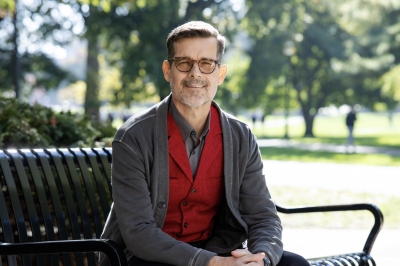
Professor Scott W. Campbell traded in maize and blue for scarlet and gray, leaving the University of Michigan to join Ohio State’s School of Communication in 2024 as the Margaret Hall and Robert Randall Rinehart Chair in Mediated Communication Research. He studies the meanings, uses and consequences of mobile media and uses communication theory to understand whether mobile media is a habit or an addiction.
In addition to his research, Campbell also teaches and mentors students and junior colleagues. He also serves as an associate editor for the Journal of Computer-Mediated Communication and has served as an associate editor of Human Communication Research.
He is currently preparing a course on the topic of media and citizenship that explores the different meanings of citizenship, the uneven landscape of citizenship, and how media plays a role in citizenship.
“I also call attention to ways in which people can be literate about the opportunities and threats of media for democracy,” he said.
Before coming to Ohio State, he worked for the University of Michigan as a professor of communication and media and of digital studies as the Constance F. and Arnold C. Pohs Professor of Telecommunication.
“I’m brand new, I’m loving it,” he said. “The intellectual community is very alive. Change for the sake of change is good. This looked like the best place I could go for a change.”
Ohio State provided Campbell a new research opportunity in the field of mobile media.
“I am studying the social uses and consequences of mobile media and the perceptions of smartphone addiction. With a habit, your awareness is diminished, but you are somewhat aware. I am trying to bring awareness to awareness,” Campbell said.
Campbell’s interest in mobile media started decades ago. The Nebraska native received his journalism undergraduate degree from the University of Nebraska. Post-graduation, he worked as a communications specialist with Integrated Marketing Solutions and then took a job at Sprint PCS, where he developed his interest in the area of mobile media and communication.
His early days working in the field were very different from today.
“When the World Wide Web hit, it changed the way we did everything,” said Campbell.
The more popular the Internet became, the more research was needed on its impact on society.
“Mobile communication was becoming an everyday thing and it was blowing my socks off,” he said.
After seven years in the communications and media workforce, Campbell decided to go back to school to get his PhD from the University of Kansas. He was eager to begin researching mobile media full-time.
Campbell moved to Hawaii fresh out of graduate school and took a job as an assistant professor at Hawaii Pacific University, where he began researching mobile media.
“It was me and five people on the planet studying cell phone use. I spent three years there,” Campbell said.
Campbell continued his research in this area after accepting a position at the University of Michigan.
“There was a position, specifically studying mobile media, at Michigan, which was one of the first positions ever available,” Campbell said.
Campbell worked for the University of Michigan from 2005-2024, earning tenure in 2011 and being named a full professor in 2016.
Campbell serves as the Margaret Hall and Robert Randall Rinehart Chair at Ohio State.
“These positions are funded by donors. Robert Rinehart gave the money for this position. It is much more than just a title. I am going to honor the family who gave the money by doing important work and being productive. On a day-to-day basis I try to honor the chair by expressing the values of Ohio State and the School of Communication,” said Campbell.
He also takes pride in maintaining work-life balance by spending time with his 16-year old son and is learning to play the banjo.
Article by student Brooke Fabiano
